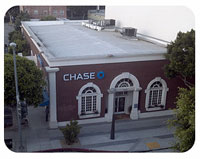Chase Gave Me A Credit Card I Didn't Want
Steven writes about how he feels he was tricked into opening a credit card he didn’t want, then still received the card even after he was vehement about canceling his unauthorized application.
He writes:
I wanted to let you guys know about the pain & suffering I have been enduring in dealing with these jokers at Chase Bank. About a month ago, I went into a branch for a simple deposit, and was solicited to sign up for overdraft protection on my checking account. I am usually skeptical about items like this, so I started asking questions. The customer service rep assured me that it was 100% completely free, no negative implications anywhere, no costs, nothing even remotely, potentially negative.
I told him to add it, and with a quick surrendering of my household income and mother’s maiden name, it was added. He started describing some of the details, and mentioned I would be receiving a card tied to the overdraft program, but that I didn’t have to use it. This struck me as a little suspicious, and I started to ask more questions. He suddenly started describing it as a ‘line of credit’, and eventually I had to drag it out of him that it was indeed a credit card the joker had signed me up for. I told him to cancel the app process immediately, and after several more attempts to reconvince me, he assured me it was cancelled. I left the bank, and on my way home, I get a call from him again trying to convince me that there are no negative implications for having the card, but I insisted that I wanted it terminated. I thought everything was taken care of, until later in the week I receive an email welcoming me to Chase Freedom, and to expect my credit card in the mail.
Sure enough, the unwanted card arrived several days later. I was furious – I felt misled
and lied to. As far as I am concerned, this constitutes fraud, and a form of predatory lending. When I attempted to call Chase and cancel the card [I refused to return to that branch after what happened], I get passed between 4-5 different departments, including customer service, credit accounts, and security. No one seems to know how to deal with this fraudulent opening. At this point, my main concern was negative reporting on my credit report. I finally got one of the reps to cancel the card, labeling it as a fraudulent account. Several weeks later, I pulled a credit report, and both the card and the inquiry are being reported to the bureaus. Imagine my fury. I called the Chase fraud line once again, only to get passed between three people and then disconnected. As a last resort, I called the branch manager and explained the situation, along with my requests to a)have the items removed from my credit history and b)reimburse me for $50, to cover the cost of pulling my three reports. He told me that he would contact Chase’s back office to try to resolve the credit report issue from their side [of which I am doubtful much can be done] and that he would most likely be unable to reimburse me $50, as they apparently can only reverse any insufficient funds fees or overdraft fees. I am sorry Chase, but I don’t have any of those charges that contribute oh-so-much to your bottom line. I told him this is a matter of me cancelling my account with them, and asked him if that was worth $50. It amazes me how little banks can do in the way of resolving customer issues. This is by far the most miserable customer service experience I have ever had.
Since Steven shouldn’t have paid $50 for something he could get for free, it’s hard to argue Chase should refund him the money. But it’s also inexcusable that the bank allowed his account to open and that it gave him such a hassle to wipe it off his record.
If he feels that Chase has broken the law, he should report the bank to its regulating agency.
Here’s how you do that:
* Contact Chase with a formal complaint. You can do this in writing, or by email. Keep a copy of this complaint for your records.
* Figure out which agency regulates your bank by calling or using FDIC’s Bank Find.
* Write a formal complaint letter to the bank’s regulatory agency. Follow the FTC’s instructions for writing a complaint.
This document also has the correct contact information for the various regulatory agencies. Keep a copy of this complaint for your records.
According to the FDIC, “The regulatory agencies will be able to help resolve the complaint if the financial institution has violated a banking law or regulation. They may not be able to help where the consumer is not satisfied with an institution’s policy or practices, even though no law or regulation was violated. Additionally, the regulatory agencies do not resolve factual or most contractual disputes.”
By filing a complaint, the regulating agency will investigate whether Chase actually violated any banking regulations.
Want more consumer news? Visit our parent organization, Consumer Reports, for the latest on scams, recalls, and other consumer issues.


